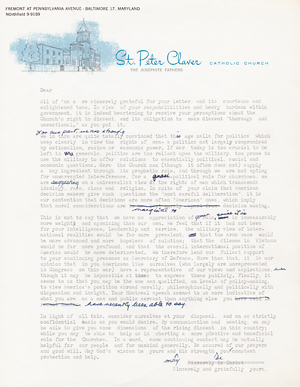Letter of Philip Berrigan to Robert McNamara, 1967



| Collection: |
Cornell University Library |
| Date: |
1967 |
| Date of Digitization: |
2004 |
| Source: |
Daniel and Philip Berrigan Collection at the Division of Rare and Manuscript Collections, Cornell University Library |
| Original Dimensions: |
? |
| Creator: |
Berrigan, Philip, 1923-2002 |
|
|
Transcription: FREMONT AT PENNSYLVANIA AVENUE - BALTIMORE 17, MARYLAND
NOrthfield 9-9159
St. Peter Claver CATHOLIC CHURCH
THE JOSEPHITE FATHERS
Dear
All of us are sincerely grateful for your letter, and its courteous and
enlightened tone. In view of your responsibilities and heavy burdens within
government, it is indeed heartening to receive your perceptions about the
Church's right to dissent, and its obligation to make dissent "thorough and
unemotional," as you put it.
[For our part, we are strongly]
We in turn are quite totally convinced that this age calls for politics which
keep clearly in view the rights of man- a politics not largely compromised
by nationalism, racism or economic power. If war today is too crucial to be
left to generals, politics are too reliant upon the military too prone to
use the military to offer solutions to essentially political, social and
economic questions. Here the Church can (though it often does not) supply
a key ingredient through its prophetic role. And through we are not opting
for unwarranted intereference, for a quasi-political role for churchmen, we
are suggesting on a universalist view of the rights of man which transcends
ideology, race, class and religion. In spite of your claim that American
decision makers give such questions the "most careful deliberation" it is
our contention that decisions are more often "American” ones which imply
that moral considerations are marginal to decision making.
This is not to say that we have no appreciation of your role, since it is immeasurably
more weighty and agonizing than our own. We feel that if it had not been
for your intelligence, leadership and service, the military view of inter-
national realities would be far more prevalent, that the arms race would
be more advanced and more hopeless of solution; that the dilemma in Vietanm
would be far more profound, and that the overall international position of
America would be more deteriorated. We therefore lend our fullest support
to your continuing presence as Secretary of Defense. More than that, it is our
opinion that in you Americans like ourselves (who largely are unrepresented
in Congress on this war) have a representative of our views and aspirations, even
though it may be impossible at times to express these publicly. Finally, it
seems to us that you may be the one man qualified, on levels of policy-making,
to view America's position abroad morally, philosophically and politically with
dispassion and insight. Your Montreal speech seemed to us more indicative of
what you are as a man and public servant than anything else you
have recently been able to say.
In light of all this, consider ourselves at your disposal, and on as strictly
confidential basis as you would desire. By communication and meeting, we may
be able to give you some dimensions of the rising dissent in this country;
while you may be able to help us in charting a more positive and beneficial
role for the Churches. In a word, some continuing contact may be mutually
helpful for our people and for mankind generally. Be assured of our prayers
and good will. May God's wisdom be yours and may His strength be your constant
protection and help.
Sincerely and gratefully yours,




